Index relies entirely on the support of donors and readers to do its work.
Help us keep amplifying censored voices today.
Dear Mr. President
We, 48 undersigned organizations from 24 countries, strongly condemn the continuing wave of detentions and harassment of peaceful protesters, journalists, human rights defenders, civil society activists, anarchists and opposition party members in Belarus.
Most of the detentions and harassment are linked to participation in peaceful protests demanding the cancellation of Presidential Decree No. 3, the so-called “social parasite” legislation, which imposes a tax on unemployed people in Belarus. Decree No. 3 obligates citizens to work a specific number of days or pay a special duty to the State under threat of arrest. This is contrary to Art. 41 of the Belarusian Constitution and violates international human rights law.
According to reports from Belarusian and international human rights organizations, as of 22 March 2017 more than 250 people have been detained since 3 March 2017, including at least 31 journalists. At least 110 people have been sentenced to 3-15 days of administrative arrest. Many of them remain in detention, while others have been subject to different forms of harassment.
We strongly condemn the fact that several detentions of peaceful protesters at different places across Belarus have been carried out with the excessive use of force by Belarusian security officers.
Several Belarusian organizations have announced a demonstration that will take place in Minsk and in other cities in Belarus on 25 March 2017. We are deeply concerned about the physical and psychological integrity of the participants of these protest marches.
As the president of Belarus we urge you:
Signatories:
Albanian Helsinki Committee
Analytical Center for Interethnic Cooperation and Consultations (Georgia)
Article 19 (UK)
Association UMDPL (Ukraine)
Bir Duino (Kyrgyzstan)
Bulgarian Helsinki Committee
Center for Civil Liberties (Ukraine)
Center for the Development of Democracy and Human Rights (Russia)
Charity foundation “East-SOS” (Ukraine)
Civic Belarus (Czech Republic)
CIVICUS: World Alliance for Citizen Participation, Johannesburg
Committee to Protect Journalists (USA)
Crude Accountability (USA)
FIDH, Paris
Freedom Files (Russia/Poland)
German-Russian Exchange (Germany)
Helsinki Committee for Human Rights in Serbia
Helsinki Committee of Armenia
Helsinki Foundation for Human Rights (Poland)
Human Rights Center “Postup” (Ukraine)
Human Rights Center (Azerbaijan)
Human Rights Information Center (Ukraine)
Human Rights Monitoring Institute (Lithuania)
Humanrights.ch (Switzerland)
Index on Censorship (UK)
Institute Respublica (Ukraine)
International Partnership for Human Rights (Belgium)
IRFS (Azerbaijan)
JEF Europe: Young European Federalists, Brussels
Kazakhstan Interantional Bureau for Human Rights and the Rule of Law
Kharkiv Human Rights Protection Group (Ukraine)
KRF Public Alternative (Ukraine)
Libereco – Partnership for Human Rights (Switzerland/Germany)
Macedonian Helsinki Committee
Memorial International, Moscow
Menschenrechte in Belarus e.V. (Germany)
Moscow Helsinki Group (Russia)
NESEHNUTI – Independent Social Ecological Movement (Czech Republic)
Norwegian Helsinki Committee
Ostgruppen – Swedish Initiative for Democracy and Human Rights
Promo LEX (Moldova)
Protection of Rights without Borders NGO (Armenia)
Public Verdict Foundation Russia)
Reporters Without Borders International, Paris
The Netherlands Helsinki Committee
The Swiss Helsinki Committee
Ukrainian Helsinki Human Rights Union
World Organisation Against Torture (OMCT), Geneva
[vc_row][vc_column][vc_column_text]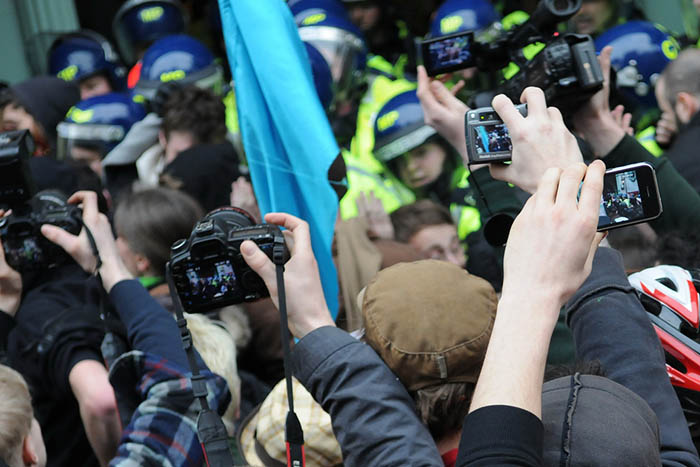
Each week, Index on Censorship’s Mapping Media Freedom project verifies threats, violations and limitations faced by the media throughout the European Union and neighbouring countries. Here are recent reports that give us cause for concern.
Five journalists were detained in Orsha on 12 March after covering a protest against a new law that would tax unemployed people labeled as “parasites”, Radio Svaboda reported.
Radio Svaboda’s Halina Abakunchyk, photographer for BelaPAN Andrei Shaulyuha and blogger Anastasia Pilyuhina were detained after the rally along with demonstrators and taken to Orsha district police department.
Freelance journalists working for TV channel Belsat, Alyaksandr Barazenka and Katsyaryna Bahvalava, went to the police station to get a comment from a detained opposition activist, only to be detained as well. Pending trial they spent the night in jail.
Abakunchyk and Bakhvalava were ordered to pay fines. Abakunchyk was accused of participating in an unsanctioned mass event under Aryicle 23.34 of the Code of Administrative Offences and fined approximately €280. Bakhvalava was accused of illegal production and distribution of media products and disobeying the police under Article 22.9 and Article 23.4 of the Code of Administrative Offences and fined approximately €340.
Up to 18 journalists and bloggers were arrested while covering the protests, IFJ reported.
Conservative MP Jean-François Mancel filed a proposed law to the National Assembly on 10 March which intends “to remove protection of the confidentiality of journalistic sources if protection of the public interest justifies it“.
The proposed law reads: “Contrary to what is generally said by journalists and their representatives, the systematic protection of sources’ confidentiality and the will to further reinforce it seriously compromises the respect of individual freedoms and the protection of civilians against acts of aggression from the media.”
Mancel accused journalists who have covered allegations of fraud involving conservative candidate François Fillon of going after the candidate unfairly, for instance on his Twitter account.
[/vc_column_text][/vc_column][/vc_row][vc_row equal_height=”yes” css=”.vc_custom_1490021682242{background-color: #d5473c !important;background-position: center !important;background-repeat: no-repeat !important;background-size: cover !important;}” el_class=”text_white”][vc_column width=”1/2″][vc_column_text]
[/vc_column_text][/vc_column][vc_column width=”1/2″ css=”.vc_custom_1490021461628{background-image: url(https://www.indexoncensorship.org/wp-content/uploads/2017/01/MMF_report_2016_WEB-1-1A.jpg?id=85872) !important;}”][/vc_column][/vc_row][vc_row][vc_column][vc_column_text]
Hakan Büyük, a Turkish-Dutch journalist for the newspaper Zaman Vandaag has been receiving death threats on Twitter, news portal Villamedia reported on 13 March.
The threats began after a diplomatic row between Turkey and The Netherlands led to violent pro-Erdogan protests in the streets of Rotterdam. Earlier, Dutch authorities banned a Turkish minister from campaigning for an upcoming Turkish referendum.
Büyük received at least ten threats in Turkish, one of which read: “We will not arrest you, you will be killed.” He has filed charges with the police.
Zaman Vandaag was founded by Gulen sympathisers, who are being blamed for the failed coup in Turkey in the summer of 2016.
Unidentified protesters assaulted and verbally harassed two different TV crews during a pro-opposition protest on 10 March in Skopje, news agency META reported.
Hristijan Banevski, a reporter for private broadcaster TV 24, was “firstly verbally attacked and then hit in the head with a stick holding a flag during the protest in Skopje”.
That same night, a TV Telma crew was verbally harassed while interviewing protesters. Without giving much detail, the channel reported that their journalists were cursed at.
Local journalists’ associations have called upon the Macedonian institutions to take appropriate measures and to come out in defence of the journalists, news agency META reported.
President of the Association of Journalists of Macedonia (ZNM), Naser Selmani, underlined that what is worrying is that public officials, including representatives of state institutions, participated in these coordinated attacks.
In the last four years, according to ZNM’s data, 44 attacks against journalists were reported in Macedonia. Out of these, 19 occurred in 2016.
Officers from the Russian Security Service (FSB) detained reporter Igor Zalyubovin and photographer Vladimir Yarotsky for the Moscow-based independent news magazine Snob on 7 March, the publication said in a statement. The journalists were in the apartment they rented to report on daily life in the city of Svetogorsk.
An article was planned as a response to Svetogorsk Mayor Sergey Davydov’s 1 March claim that there were no homosexuals in the city, and that it was a “city without sin,” according to press reports.
On 7 March, the Committee to Protect Journalists issued a statement saying Russian security services should stop harassing and obstructing journalists and should allow them to work unimpeded.
To visit Svetogorsk requires either a Schengen visa to enter via Finland, an invitation from a local resident, or a special permit from the FSB, according to 2014 legislation. Snob’s editor-in-chief, Yegor Mostovshikov, told the news website Meduza today that his outlet did not apply for a permit from the FSB “because it takes up to 30 days to get it.”[/vc_column_text][/vc_column][/vc_row][vc_row][vc_column][vc_column_text]
Click on the bubbles to view reports or double-click to zoom in on specific regions. The full site can be accessed at https://mappingmediafreedom.org/
[/vc_column_text][/vc_column][/vc_row][vc_row][vc_column][vc_basic_grid post_type=”post” max_items=”4″ element_width=”6″ grid_id=”vc_gid:1490021029215-ef5a3b8c-778c-2″ taxonomies=”6564″][/vc_column][/vc_row]
On 11 September, the people of Belarus elected the lower house of parliament, the House of Representatives.
Speaking about the media environment surrounding the elections, the United Nations special rapporteur on human rights in Belarus, Miklós Haraszti, said: “It is regrettable that Belarus did not take into account real changes towards equal media access, verifiable turnout, honest vote count, and a pluralistic parliament. These changes have been recommended for many years by the OSCE, and my own reports.”
As in previous elections, independent journalists were denied access to information about the work of electoral commissions. On 10 August, during a district election commission meeting in the town of Barysau, the deputy chairman refused to answer a question about the candidates for the lower chamber of the Belarusian parliament posed by editor-in-chief of local independent newspaper Borisovskiye novosti, Anatol Bukas. A complaint filed by Bukas to the Central Election Commission was dismissed.
On election day, a correspondent for the independent newspaper Nasha Niva was forbidden to take photos at the polling station where the president of Belarus, Alexander Lukashenka, was supposed to vote. Security guards in civilian clothes said the journalist had not been accredited.
Opposition candidates faced arbitrary bans and censorship in publishing their “election programmes”, which lay out their platforms. Under Belarusian law, state-run media outlets should give an equal opportunity to all candidates to publish their programmes, but editors of state-run media refused to publish some which contained criticism of the authorities. The candidates referenced the election law, but have not been told of any specific violations in the texts. Complaints by the MP candidates have not been responded to by officials.
State-run newspaper Vecherniy Minsk refused to publish an election programme by opposition activist and Belsat TV’s anchorman Yury Khashchavatski. Vecherniy Minsk’s editor-in-chief Syarhei Protas wrote that the election programme “cannot be published because it does not comply with the requirements of Articles 47 and 75 of the Electoral Code of the Republic of Belarus”.
These articles state that “a candidate’s program must not contain propaganda for war, incitement to violent change of the constitutional order or violation of territorial integrity of the Republic of Belarus, to social, national, religious and racial hatred”.
A candidate’s programme must also not encourage or call up to obstruction, cancellation, or postponement of elections and there should be no insults or slandering against Belarusian officials or other candidates. However, the editor of Vecherniy Minsk did not indicate which statements of Khashchavatski were supposedly illegal.
According to Yury Khashchavatski, he never violated the law in his election programme and the editor might not have liked some his words about president Lukashenka.
A candidate from the United Civil Party Mikalay Ulasevich found himself in the same situation when local state-run newspaper Astravetskaya Prauda in Astravets, in Hrodna region, refused to publish his election programme referring to the same grounds. Moreover Hrodna regional state television did not broadcast Ulasevich’s speech. In his address to electors, which was recorded but not aired at the scheduled time, Ulasevich opposed the construction of a nuclear power plant in Belarus and spoke about a corruption problem in the country. Mikalay Ulasevich is behind the public initiative Astravets Nuclear Power Plant Is A Crime. According to Belarusian law, all candidates have a right to broadcast election speeches on state-run TV during the election campaign.
Giving an assessment of media freedom during the last parliamentary election Andrei Bastunets, Chairperson of BAJ, said: “We explain some easing of pressure on journalists during the elections with the desire of the Belarusian authorities to obtain a positive assessment of the election campaign by the international structures. It follows on the need to seek credits in the conditions of economic crisis and does not expel resumption of the previous practice of persecution of journalists after the elections.”
Mapping Media Freedom
|
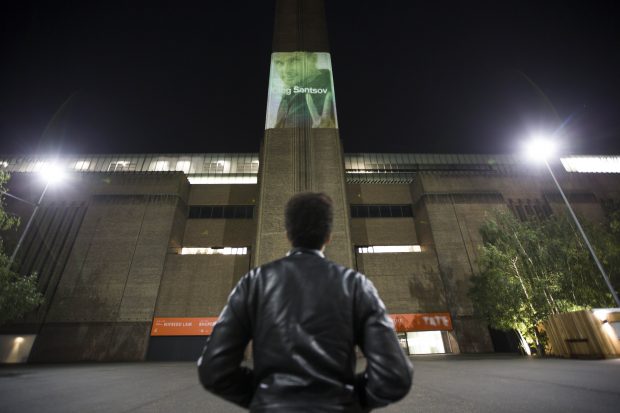
10 October 2016: Belarus Free Theatre project Ai Weiwei’s symbol of freedom of expression onto five iconic buildings across London to highlight the case of Oleg Sentsov. Credit: Graeme Robertson
The Belarus Free Theatre, which campaigns for free expression in Belarus, is calling on the British government to pressurise the Russian authorities to release prisoners whose only crime is to have opposed the annexation of Crimea, an act that the British Government has declared illegal.
“We urgently call upon British politicians to put justice, human rights and international law ahead of business interests and to look afresh at the cases of the Kremlin hostages, [and] all political prisoners held by Russia, including our friend Oleg Sentsov,” co-founding artistic director of Belarus Free Theatre, Natalia Kaliada said.
On Monday 10 October, the theatre company hosted Freedom of Expression in Ukraine, an event at the House of Commons, in solidarity with Oleg Sentsov, a popular film director and pro-Ukrainian activist serving a 20-year prison sentence as well as all other Ukrainian political prisoners currently detained in Russian jails.
Sentsov is currently imprisoned in Siberia and is facing 18 more years in jail on charges of being part of a terrorist conspiracy. Sentsov has stated that he was tortured by investigators, and that a key witness recanted in the courtroom on the grounds that evidence had been extorted under torture. His lawyers describe the case against him as “absurd and fictitious”.
The night included a film calling for Sentsov’s release featuring actor Simon Callow, Belarusian Nobel Laureate for Literature Svetlana Alexievich, Polish film director and chair of European Film Academy Agnieszka Holland, actor Will Attenborough, film director Yuri Khaschevatsky and fashion designer and activist, Vivienne Westwood.
Natalia Kaplan, a cousin of Sentsov, could not be in London for the event but recorded a special video appeal for his release.
Pussy Riot’s Maria Alyokhina and members of Belarus Free Theatre read extracts of letters from Sentsov and short scenes from Belarus Free Theatre’s latest production, Burning Doors. Other speakers included Andrei Khliyvynuk, activist and frontman of Ukrainian supergroup Boombox, and film and theatre-director-turned-soldier Eugene Stepanenko.
Nobel Laureate for Literature Svetlana Alexievich and British filmmaker Lord Puttnam both recorded a special message for the event.
Sentsov first came to the attention of the international film world with Gamer, a debut feature inspired by the computer and video-gaming club for young people that he had founded. It opened to great acclaim at the Rotterdam International Film Festival in 2012.
The European Film Academy together with leading international film directors, including Pedro Almodóvar, Wim Wenders, Stephen Daldry, Mike Leigh and Ken Loach, have campaigned for Sentsov’s release, echoing the grave concerns of Amnesty International that his trial was a “total fiasco” and that the “entire case for the prosecution is built on a house of cards”.
Fernando Bovaira named Sentsov an honorary member of the 62nd San Sebastian Film Festival’s main competition jury, and a chair was reserved for him in solidarity.
During the evening, an image of Ai Weiwei’s middle finger was projected onto five iconic buildings in London: The National Gallery’s Sainsbury Wing, The Forth Plinth in Trafalgar Square, Royal Opera House, Soho’s Gerrard Street and Tate Modern, together with a short film of Sentsov’s “sham trial” to garner UK public support and attention to his plight.
Ai’s finger, is used as a symbol of freedom “a powerful reminder of the need to strive for justice and freedom of expression,” explained Kaliada.
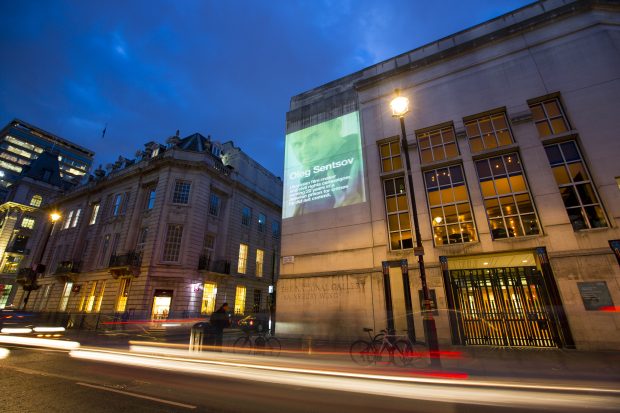
Credit: Graeme Robertson.
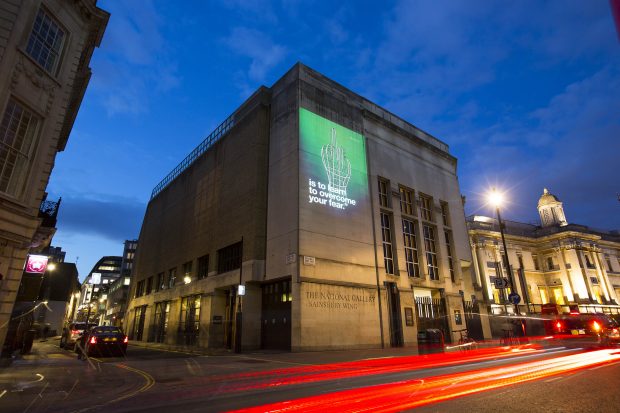
Credit: Graeme Robertson
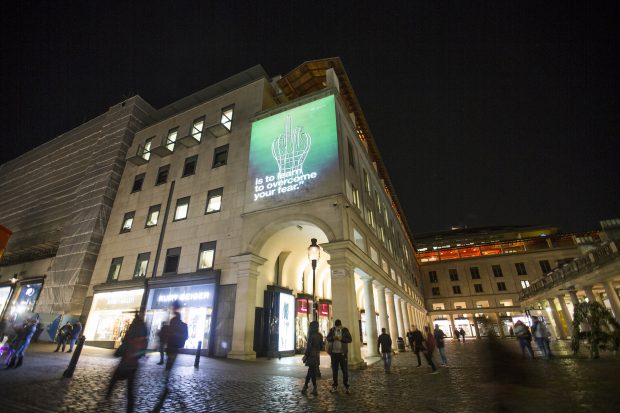
Credit: Graeme Robertson
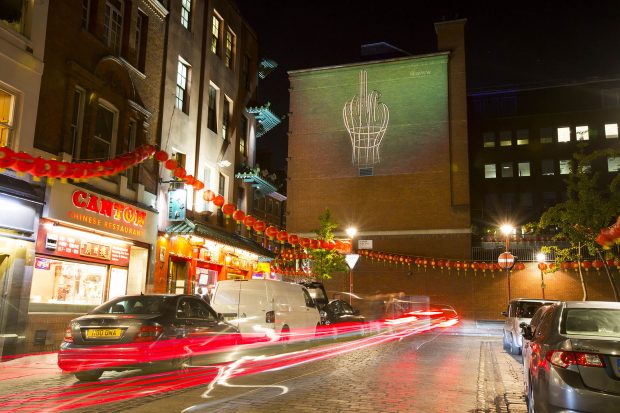
Credit: Graeme Robertson
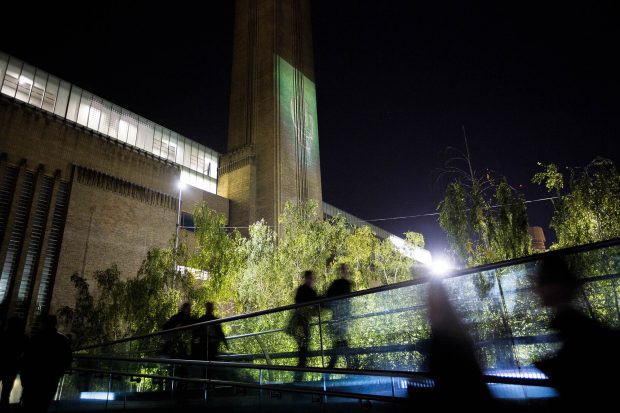
Credit: Graeme Robertson
The demonstration was part of Belarus Free Theatre’s I’m with the Banned campaign which is an artist-led effort to bring together those who live in political freedom in solidarity with artists and activists who are censored or imprisoned in Belarus, Russia, Ukraine and anywhere else in the world where justice and freedom are denied.
Kaliada said: “In recent months, Ukraine has disappeared off the public radar even though the war rages on and Russia continues to drag the world into a new Cold War at a highly sophisticated level that endangers people living in the geopolitical knot known as Ukraine, Belarus and Russia, as well as threatening the global security of people further across the world.”
She said that London is where the founding members of Belarus Free Theatre sought shelter five years ago when they arrived in the UK as political refugees from Belarus.”For one night, the walls of the city will speak on behalf of those who are silenced, and one of the greatest capitals of the world will stand with us in solidarity with Oleg Sentsov,” she said. “As contemporary artists and human beings we have only one tool: creativity.”